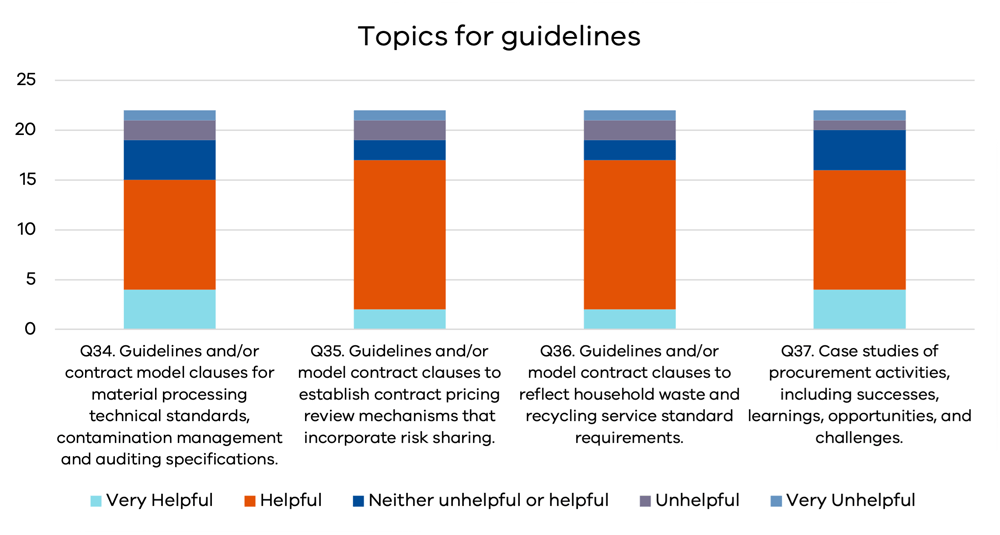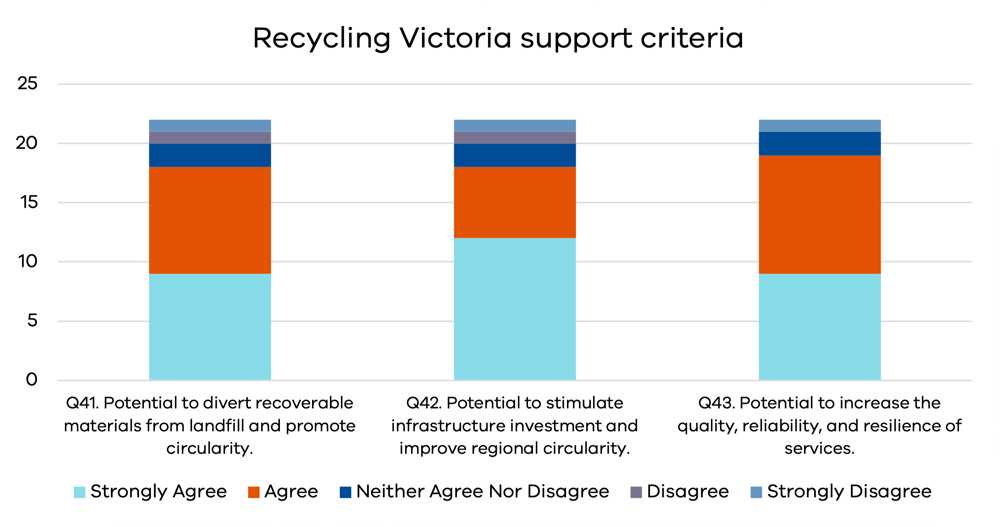- Published by:
- Recycling Victoria
Introduction
Under the Circular Economy (Waste Reduction and Recycling Act) 2021, (CE Act) a key function of Recycling Victoria is to support best practice procurement management by councils, Alpine Resorts Victoria (ARV) and service providers for waste, recycling and resource recovery services.
Recycling Victoria developed a draft Strategic Procurement Framework (framework) that set out how we intend to deliver this legislative function, the potential support we may provide, and how we will prioritise the support.
This report provides an overview of the consultation process undertaken by Recycling Victoria on the draft framework. It summarises the engagement opportunities we provided, what we heard and how this feedback has been used.
Engagement snapshot
Engagement opportunities
- Survey
- Submissions
- Online information sessions
- Opportunity to ask questions via a dedicated email address
- Briefings with key stakeholders
- One-on-one discussions
Engagement responses
22 survey responses including from:
- 17 councils (10 metropolitan and 7 regional)
- 3 industry representatives
- 2 members of the public.
1 written submission.
40 attendees at online event.
Key themes
Feedback provided through each of the engagement activities revealed some key themes outlined below.
- Recycling Victoria’s advice and support is most valued during the initial strategic planning and analysis stages (stages 1, 2 and 3) and at the end of the procurement process to support contract preparation and knowledge sharing / lessons learned (stages 9 and 10).
- All the proposed supports were seen to be useful and were broadly supported by respondents. The feedback received will be helpful in guiding implementation of the proposed supports.
- Information and guidance developed by Recycling Victoria should be meaningful and targeted, as well as being easily accessible and available in a timely manner.
- There was feedback that it should not be mandatory for councils or ARV to utilise any information or guidance provided by Recycling Victoria to support their procurements.
- Industry feedback included that engagement with them is an important part of developing procurement information and guidance.
Methodology
During August and September 2024, Recycling Victoria provided stakeholders the opportunity to review and provide feedback on the draft Strategic Procurement Framework through a range of activities.
Engage Victoria
Stakeholders were invited to participate in a survey on Engage Victoria from 12 August to 20 September 2024.
Online information session
Recycling Victoria invited councils and alpine resorts to an online information session during the consultation period. An overview of the draft Strategic Procurement Framework and the consultation process was provided, along with the opportunity to ask questions.
There were 40 attendees at this session representing 39 local councils. A number of questions were raised at the session and responded to at the time.
Enquiries
A dedicated email address was provided for written submissions and any questions during the consultation period. Interaction with this mailbox was limited with the stakeholder preference being to complete a survey or attend the information session.
Briefings
Recycling Victoria conducted briefings with various stakeholder forums including the Circular Economy Portfolio Coordination Group, Local Government Advisory Committee, Local Government CEO Forum, Resource Recovery, Recycling and Waste Industry Group, and Recycling Victoria Advisory Committee.
One-on-one discussions
We had valuable one-on-one discussions with stakeholders throughout the consultation period via phone or in person. Primarily, these discussions were with internal stakeholders across Recycling Victoria and the Department of Energy, Environment and Climate Action. We also spoke with other organisations that provide procurement support.
Engagement principles
We adopted the core principles of public engagement as outlined in our Charter of Engagement which is aligned with the Victorian Public Sector Public Engagement Framework 2021–25. When we engage, we ensure our activities are:
Meaningful
The process of public engagement is genuine and informs the final decisions.
Inclusive
The engagement is respectful, inclusive and accessible.
Transparent
The engagement is clear and open about what the public can and cannot influence.
Informed
The engagement provides relevant and timely information to the public.
Accountable
The engagement is high quality and responsive to the public.
Valuable
The engagement creates value for the community and government. This can include social, economic, and environmental value.
What we heard
Through a survey, we asked for feedback on the support Recycling Victoria was proposing to provide and how this would be prioritised. These questions also guided our discussions through other engagement activities.
This section summarises what we heard through the consultation process.
Proposed Recycling Victoria supports
Survey participants were asked to respond on the value of each of the proposed supports being offered by Recycling Victoria at each stage of a procurement process.
Summary of responses for each procurement stage
Figure 1 describes the proposed supports being offered by Recycling Victoria at the strategic planning, options analysis and procurement strategy development stages of a procurement. It indicates that respondents found each of the proposed supports helpful, with the most helpful being data and market intelligence to inform strategic planning.
Stages 1 and 2 refer to early strategic planning and options analysis. Respondents indicated that all proposed supports offered at these stages would help councils and ARV with informed decision making to strategically plan their procurement processes. The most helpful was seen to be data and market intelligence to inform strategic planning.
Feedback from respondents included that the advice and market intelligence provided by Recycling Victoria needs to be meaningful and targeted. This will assist councils and ARV to make evidence-based procurement decisions and deliver best value services.
Respondents also suggested that Recycling Victoria’s advice and market intelligence should support procurements to stimulate sector investment, growth, build capacity and increase capability across the state’s waste and resource recovery system. This included potential statewide and regional opportunities.
Some respondents provided feedback that the supports may be of most help for councils with limited resources. Others raised concerns about councils resourcing to effectively make the most of the information being provided at these particular stages. Recycling Victoria notes the framework is designed to complement other support available to councils and alpine resorts in the marketplace. Recycling Victoria can signpost these supports as required.
Stage 3 is where councils and ARV determine the proposed strategic approach to tendering. Respondents rated the proposed supports for this stage as helpful, with advice on potential tendering approaches and compliance with legislation and standards considered the most helpful.
Recycling Victoria’s advice and support in connecting councils and alpine resorts with expertise to assist with procurement was seen as relatively less helpful, although only a small number of respondents considered this to be unhelpful. As such, Recycling Victoria proposes to maintain a list of expertise options to share with councils and alpine resorts as needed.
Some respondents noted that in providing support during this stage, Recycling Victoria should consider alignment with individual council and alpine resort procurement policies and guidelines. Feedback also suggested that advice relating to the various steps and associated timelines for a joint procurement process would be valuable.
“It is hoped that key learnings from previous procurement experiences will be applied to result in contracts that are suitably apportioned with risk for both the councils/ARV and the operator as parts of the circular economy supply chain.”
“We encourage RV to use its best endeavours to drive councils and ARV towards statewide and regional opportunities in accord with the VRIP.”
“It is hoped that RV’s responsibility to collect, analyse and report on data about the waste and recycling sector will be reflected in this procurement support, and that high quality data on waste flows and recovery rates across Victoria will be shared to enable local government and ARV to make evidence-led procurement decisions.”
Figure 2 describes the proposed supports being offered by Recycling Victoria at the procurement strategy formalisation and ACCC / DTF authorisation stages of a procurement. These stages are likely to only apply to collaborative procurement exercises. Templates or examples of a Memorandum of Understanding (MOU) for collaborative procurement were considered helpful to assist councils and alpine resorts in formalising their approaches.
Respondents said they would find the provision of example tender documentation at stage 6 helpful. Connecting councils and alpine resorts with procurement training was considered less helpful, but only a small number of respondents considered it unhelpful.
Recycling Victoria acknowledges that there is a preference to incorporate the provision of example contract terms and conditions at this stage, rather than at stage 9 as reflected in the draft framework. Table 1 of the published framework has been updated to reflect this.
Recycling Victoria’s proposed support at stages 7 and 8 is confined to providing example documents and advice on their use. The supports at stage 7 are deemed to be more helpful than under stage 8. Again however, only a small number of respondents considered them to be unhelpful.
“These would be useful for smaller councils with fewer resources so would be a valuable contribution.”
“Templates and example documentation for collaborative council tender evaluation plans and assessment would be useful. They also need to be updated regularly.”
“Council supports the supply of standardised tender evaluation documentation as a point of reference and advice on their use. Council believes that Recycling Victoria could add value to any collaborative procurement process through supply of or advice on experts for a tender or probity advisors.”
Figure 3 describes the proposed supports being offered by Recycling Victoria at the tender initiation and evaluation stages of a procurement. It indicates that respondents found example tender documentation the most helpful, followed by example documents such as reference checks and clarification plan templates.
Respondents said they would find the provision of example tender documentation at stage 6 helpful. Connecting councils and alpine resorts with procurement training was considered less helpful, but only a small number of respondents considered it unhelpful.
Recycling Victoria acknowledges that there is a preference to incorporate the provision of example contract terms and conditions at this stage, rather than at stage 9 as reflected in the draft framework. Table 1 of the published framework has been updated to reflect this.
Recycling Victoria’s proposed support at stages 7 and 8 is confined to providing example documents and advice on their use. The supports at stage 7 are deemed to be more helpful than under stage 8. Again however, only a small number of respondents considered them to be unhelpful.
“These would be useful for smaller councils with fewer resources so would be a valuable contribution.”
“Templates and example documentation for collaborative council tender evaluation plans and assessment would be useful. They also need to be updated regularly.”
“Council supports the supply of standardised tender evaluation documentation as a point of reference and advice on their use. Council believes that Recycling Victoria could add value to any collaborative procurement process through supply of or advice on experts for a tender or probity advisors.”
Figure 4 describes the proposed supports being offered by Recycling Victoria at the contract commencement and post procurement review stages of a procurement. It indicates that example documents and facilitation of learning forums were considered helpful by respondents.
Respondents suggested that the provision of example contract conditions would be helpful earlier on in the process at stage 6, as well as stage 9. Recycling Victoria has updated the framework to include example contract terms / conditions at stage 6 and to make available example contract documents at stage 9. This will assist councils and alpine resorts in developing and formatting their contracts for execution.
Respondents indicated that the Recycling Victoria supports proposed under stage 10 would be worthwhile. Providing example documents and hosting learning / knowledge sharing forums at the conclusion of the procurement process would be valuable to facilitate continuous improvement.
“Helpful if contract conditions advice is tailored to the specific use case.”
“This is where the opportunities exist for RV. The existing User Group Meetings are a gold mine of information exchange and informal discussion occurs. The Waste Industry is one of few collaborative sections of Local Government and it works extremely well.”
“With the current dynamic waste stream learning forums and knowledge sharing would be very valuable and could form part of our continuous improvement approach.”
Figure 5 describes the types of guidelines that Recycling Victoria may provide in the future relating to the procurement of waste, recycling or resource recovery services by councils or Alpine Resorts Victoria. It indicates that all proposed topics were considered helpful by respondents.
Recycling Victoria in future may provide guidelines relating to the procurement of waste, recycling or resource recovery services by councils or ARV. The survey asked participants to consider what topics for guidance would be most helpful.
Most respondents regarded all 4 guideline topics proposed in the consultation survey as being helpful.
Additional feedback included that guidelines and case studies should be flexible and not mandatory for councils and alpine resorts to have to follow. It was also noted that Recycling Victoria should consult with stakeholders including waste, recycling and resource recovery industry representatives in developing guidelines.
Respondents also suggested the following additional topics for guidelines:
- Circular economy procurement objectives, such as buy-back of end products (such as composts and recyclate).
- When to combine or separate contracts for different waste streams.
- Hard waste services.
- Price benchmarking and key price indexes that can be used for rise and fall calculations.
- The potential risk of unintended consequences of relying on price and risk sharing mechanisms alone.
Recycling Victoria will consider these responses as we progress with creating a program for developing guidelines and case studies.
“RV should also engage with industry on the development of any guidelines so that they are realistic and workable.”
“Helpful for reference, particularly examples of technical standards, contamination management and auditing specifications.”
“We encourage the guidelines to be focused on the objectives of the circular economy and include topics such as buy-back of end-products and clear specifications about input and output materials.”
Figure 6 describes the proposed criteria that Recycling Victoria would use to identify and prioritise its support activities. It indicates a strong level of support for the proposed criteria.
The feedback showed strong support for the criteria proposed in the draft framework. As such, the criteria outlined in the ‘planning and priority setting’ section of the published framework remains unchanged from the draft version.
“Agree with all the proposed criteria for determining and prioritising the council and ARV procurement activities that Recycling Victoria will support.”
General feedback on the draft framework
General feedback on the draft Strategic Procurement Framework was invited throughout the consultation process. Much of the feedback referred to additional support that would be outside the scope of the framework.
Some respondents suggested the Victorian Government should not only support but deliver regional strategic procurement projects to ensure the recommendations in the Victorian Recycling Infrastructure Plan will be successfully delivered. The delivery of procurement events sits outside of the legislative function of Recycling Victoria and as a result cannot form part of our strategic procurement support function.
As outlined in the draft Strategic Procurement Framework, there may be circumstances of state significance where procurement processes would benefit from Recycling Victoria’s specific support. Under section 56 of the CE Act, in such situations Recycling Victoria may enter into a written agreement with a council or ARV and would require agreement by all parties on suitable resourcing and/or funding models.
The framework does not account for the additional roles that will need to be filled by council and/or ARV staff or external consultants, which may increase the overall cost of procurement activities. The framework does not create additional responsibilities for councils or ARV and is designed to support them in achieving best value from procurement processes. Historically, councils have contributed to the costs of external expertise engaged by the former waste and resource recovery groups.
How this feedback has been applied
Recycling Victoria has used the feedback to update and refine sections of the framework, including:
- Table 1 has been updated to include feedback on specific supports.
- Updates to the “purpose of the framework” and “our approach” sections to clarify:
− the role of Recycling Victoria
− that councils and ARV are responsible for procurement processes and decision making
− that the advice and guidance provided by Recycling Victoria is not mandatory. - Addition of a section on Recycling Victoria’s approach to the development of guidelines.
Respondents provided some valuable insight into how they want Recycling Victoria’s support and advice to be delivered. We will consider this feedback as we develop our strategy for the delivery of procurement support.
There was a modest response from councils seeking support for individual procurement processes. The priority for Recycling Victoria will be developing standard tools and resources that can deliver improved procurement outcomes across the sector more broadly. The draft framework’s “Prioritising our activity” section has been refined accordingly and no longer includes a 3-year rolling action plan, which allows Recycling Victoria to be more agile in responding to procurement needs and circumstances.
Next steps
Recycling Victoria thanks all respondents for their valuable insights and contributions on the draft Strategic Procurement Framework. We look forward to continuing to work with councils, ARV and the waste, recycling and resource recovery industry to develop and deliver the supports under the framework.
Updated






